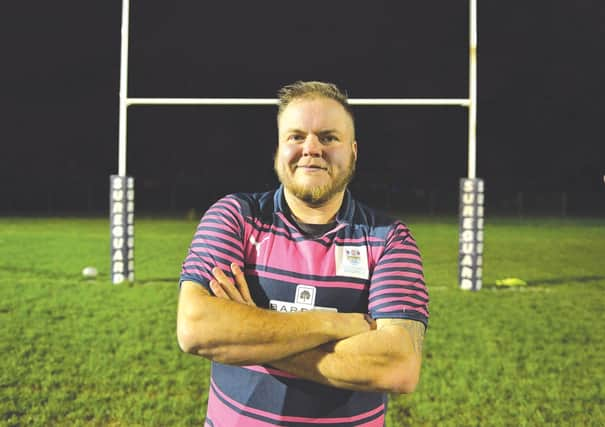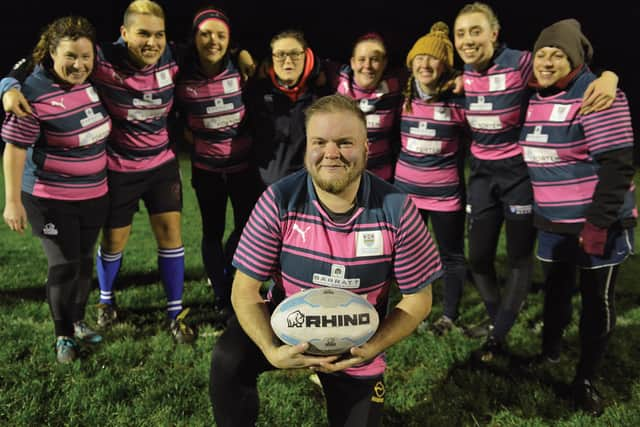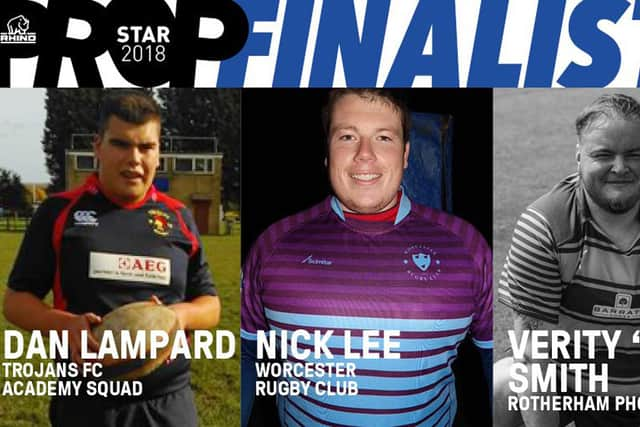Worth fighting for: the sporting story of trans-male rugby player Verity Smith


He’s had blood spat in his mouth by an opponent, been ordered to leave the field because he was perceived as a danger to women and has been laughed and sniggered at.
But after 26 years in rugby, Verity is still standing.
The Rotherham Ladies player is transitioning from a woman to a man.
Advertisement
Hide AdAdvertisement
Hide AdFighting prejudice and ignorance has been a part of life’s journey. He’s contemplated not being here, shed many private tears but never once has hidden in a corner, away from the ignorant people whose perceptions he is trying to change.
At the age of 37, he is one of three players nominated for the Rhino Prop Star of the Year award to find grassroots rugby’s best prop. It is not about skills, it is about much more than that and there surely couldn’t be a more worthy winner.
From an early age, Verity felt strangely different.
“I was never girly, I never fitted in,” he says. “I never wore girly clothes, I hated it. I once had a row with my parents about having to wear a bridesmaids’ dress. It cost my dad £50 and that was worth an argument but my mum and dad were good. They didn’t try and stereotype me. I was quite lucky.
“I came out at school and when I was 13 they took me to a gay youth club.”
Advertisement
Hide AdAdvertisement
Hide AdVerity, or Vez, as known by friends, lost both parents when he was young and was brought up by his two grandmas who were equally accepting. “Should I call you Fred now or what,” said one of them after Verity revealed the truth about his gender.
As a teenager Verity had polycystic ovarian syndrome, one of the side effects of which is to grow facial hair. He went through the menopause at 19 and had an hysterectomy at 22.
All the while the medicine in his life, the real passion, was rugby.
“I finally came out when the RFU transgender policies came out,” says Vez. “I’d always known but it was easier to keep quiet because I wouldn’t have had a team or a family and wouldn’t have been able to play women’s rugby or men’s rugby.
Advertisement
Hide AdAdvertisement
Hide Ad“Before rugby there was nothing. I didn’t know where to fit in, I didn’t know what to do. I messed about with other sports, football, ice hockey, anything that wasn’t girly or seemed to be a stereotype. I fell into rugby when I was about 11 and there was no looking back. But going from female to male is not an easy choice. You have to go through hormones and socially coming out.”


Verity Smith with his Rotherham Ladies teammates.
Verity has played Rugby League and Rugby Union, encountering prejudice along the way.
“A lot of people look at me and as soon as they see that facial hair, that’s it,” he says. “The biggest problem is from people who don’t understand.
“It’s been pretty horrendous really. In one game I was pinned down after a tackle and had blood spat in my mouth. In another I was escorted from the pitch when the other team took exception. I had to stand there on the sideline in my full kit watching my team-mates. It was degrading.
Advertisement
Hide AdAdvertisement
Hide Ad“I have been outed on the internet and seen players looking at pictures on their phones, sniggering.
“It’s stupid, these people don’t know about you and they don’t know your journey, they don’t know what it took. I get called ‘it’ a lot and ‘she he’.
“Has all this made me thick-skinned? Not always. There are still times when I sit and cry my eyes out and wonder what is going to happen next.
“In the past, a few times I’ve thought about not being here because it was easier than to try and fight but I’m still here and I’m still fighting.”
Advertisement
Hide AdAdvertisement
Hide AdThings are improving for LGBT players in the sport and Verity is very much at the heart of it through his job as a community development worker with Yorkshire MESMAC.
Its GBT+ Men's Health project, funded for the next three years, and aims to get more young gay, bi and trans people into sport and physical activity.
Before, transgender players couldn’t play for a ladies team. Now, they can play in the gender they were born in depending upon physicality and ability.
“You can play without too much conflict until hormone levels get raised, but it is taken on an individual basis,” says Vez, who is originally from Hull. “The RFU are looking at ways to combat that and I’m helping with that.
Advertisement
Hide AdAdvertisement
Hide Ad“In my job I work with schools, professional bodies and am running a men’s health project that helps the GBT+ community with mental health and self-esteem and getting them into sport via a Sports Buddy programme where they can get into sports without it being too scary for them. We need teams to be more inclusive and there is still a lot to do.”


Whether Verity wins the Rhino Prop Star of the Year Award or not doesn’t matter.
The most important thing is getting his story out there, changing perceptions and opening doors for others like him.
“If you don’t want to accept, then tolerate, and if you don’t know, ask. It is about getting that word out there,” he says.
Advertisement
Hide AdAdvertisement
Hide Ad“For 26 years I have had nothing to turn to, I have been fighting for everyone else and for me as well.
“Being able to see people go out there and do what they want to do, that’s important.
“I suppose it is the first time anyone has looked at an LGBT in this way. Rather than getting votes for me, I want to leave something behind for other people.
“It is never a good thing to have stuff done to you but the good coming out of this with my story etc, is turning that on its head. It’s not about being a role model, it’s about people like me seeing what I have done and thinking they can do the same.”
To vote for Verity in the Rhino Prop Star of the Year press here. The winner will be announced at the Oxford versus Cambridge varsity game at Twickenham on Thursday, December 6.